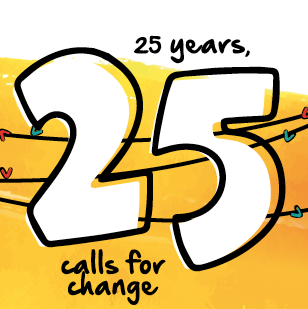In parental disputes, let’s support all family members – mums, dads and children
Responding to Call 21, Ian Maxwell says changing the culture of dispute resolution will rely on Scottish Government family law reforms being shaped by the UNCRC
11 Jun 2019
In call 21 of Children in Scotland’s 25 Calls campaign, Clare Simpson from Parenting across Scotland makes the case for families to be supported by the state in order to benefit children.
At Families Need Fathers Scotland we see particular need for support to be given to all family members in situations where parents are separating or already live apart. That's not just material support but moral and administrative and institutional support. In short, a cultural change that accepts that a child's 'family' continues even when the parents do not live together.
The Scottish Government is committed to incorporating the United Nations Convention on the Rights of the Child (UNCRC) into Scottish law. A consultation on the practicalities of doing so is under way. Article 9 of the UNCRC states: “Children whose parents have separated have the right to stay in contact with both parents, unless this could cause them harm.”
'Our experience isn't only with fathers. All the parents who contact us are struggling with situations in which it is difficult or impossible for them to see a child or children''
Unfortunately, we hear too often of institutional assumptions that where parents do not live together one will be perceived as a 'main' parent and the other, most often but not always the father, as an 'add on' to the family.
That might make the job of some professionals easier and their relationship with the 'main' parent more cordial, but it does not start from the perspective of the child as the UNCRC will require.
Too many professionals don't make the same effort to get to know both parents. Too many don't make any effort at all. A recent conference of social workers heard from a researcher who referred to her experience of “ghost fathers”. By that, she told the audience, “You have to believe in them before you can see them”.
Our experience isn't only with fathers. All the parents – fathers and mothers and other family members - who contact us are struggling with situations in which it is difficult or impossible for them to see a child or children.
We urge them to exhaust all other options before considering going to court. Contact and residence cases can become very expensive, prolong the process of resolving disagreements about sharing parenting time with children and too often create entirely new animosities between parents. All of these can be at the expense of the children they both love and want to support.
Obviously, not everybody ends up in court but nearly 13,000 families were involved with cases last year. According to the Scottish Legal Aid Board (Rethinking Legal Aid - An Independent Strategic Review by Martyn Evans – Feb 2018), the cost of these court cases in 2016-17 was £18.2 million in legal aid plus an unquantified cost for privately funded cases and the associated court costs.
This mixture of public and private money is spent to decide disputes and provide children with protection when necessary. It far outstrips the amounts of public funding available to help parents to resolve differences through relationship support, mediation and family therapy, even although these processes are usually more constructive and less damaging to families.
In Australia the state has invested large amounts of money in 65 Family Relationships Centres (FRCs) across the country, which provide information, referral and individual sessions free of charge. Initial joint family dispute resolution sessions are free and subsequent sessions have no charges for people on low incomes.
An evaluation in 2009 showed that “there is more use of relationship services, a decline in filings in the courts in children’s cases, and some evidence of a shift away from an automatic recourse to legal solutions in response to post‐separation relationship difficulties”.
Although Australia hasn't created a perfect system for supporting separated families, their work since 2005 to provide readily available help well before cases hit the courts seems to be proving cost-effective and producing better results for children and their parents.
In our submission to the consultation on Family Law Modernisation we have drawn to the Scottish Government’s attention the positive role that can be played by Family Coordinators in helping resolve the difficulties that often arise after the judge or sheriff has made a decision and closed the case. Parents who have been battling in court need to win the peace and can be assisted in that process by an independent input into remembering to put their children first.
Our message to the government is simple: prioritise constructive family support over destructive court-based family dispute resolution.
We are expecting the Scottish Government's family law modernisation proposals to be set out in a bill in Holyrood within the coming months. The UNCRC, not least the Article 9 provision, must breathe life into the family law modernisation legislation if it is to change the prevailing culture that sees children as prizes rather than individuals with rights.
Ian Maxwell is National Manager of Families Need Fathers Scotland. He is responding here to call 21 by Clare Simpson, manager of Parenting across Scotland: “Invest in relationship-based whole-family support”.


Wanted: strengthened rights, greater equality
Find out more about our campaign to improve children's lives
Find out moreCall 21
Read the original call to 'Invest in relationships-based whole family support' by Clare Simpson
Read the call